Related Research Articles
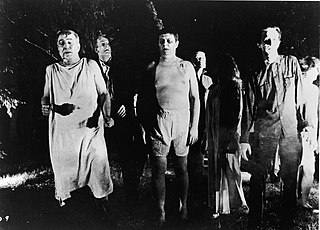
A B movie, or B film, is a type of low-budget commercial motion picture. Originally, during the Golden Age of Hollywood, this term specifically referred to films meant to be shown as the lesser-known second half of a double feature, somewhat similar to B-sides in the world of recorded music. However, the production of such films as "second features" in the United States largely declined by the end of the 1950s. This shift was due to the rise of commercial television, which prompted film studio B movie production departments to transition into television film production divisions. These divisions continued to create content similar to B movies, albeit in the form of low-budget films and series.

Stuart Maxwell Whitman was an American actor, known for his lengthy career in film and television. Whitman was born in San Francisco and raised in New York until the age of 12, when his family relocated to Los Angeles. In 1948, Whitman was discharged from the Corps of Engineers in the U.S. Army and started to study acting and appear in plays. From 1951 to 1957, Whitman had a streak working in mostly bit parts in films, including When Worlds Collide (1951), The Day the Earth Stood Still (1951), Barbed Wire (1952) and The Man from the Alamo (1952). On television, Whitman guest-starred in series such as Dr. Christian, The Roy Rogers Show, and Death Valley Days, and also had a recurring role on Highway Patrol. Whitman's first lead role was in John H. Auer's Johnny Trouble (1957).
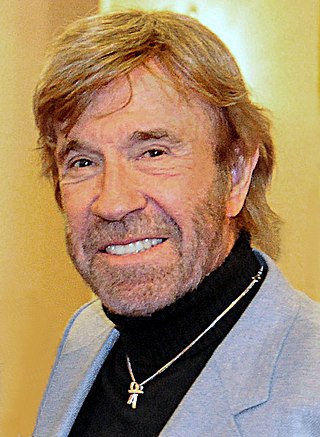
Carlos Ray "Chuck" Norris is an American martial artist and actor. He is a black belt in Tang Soo Do, Brazilian jiu jitsu and judo. After serving in the United States Air Force, Norris won many martial arts championships and later founded his own discipline, Chun Kuk Do. Shortly after, in Hollywood, Norris trained celebrities in martial arts. Norris went on to appear in a minor role in the spy film The Wrecking Crew (1969). Friend and fellow martial artist Bruce Lee invited him to play one of the main villains in Way of the Dragon (1972). While Norris continued acting, friend and student Steve McQueen suggested he take it seriously. Norris took the starring role in the action film Breaker! Breaker! (1977), which turned a profit. His second lead, Good Guys Wear Black (1978), became a hit, and he soon became a popular action film star.

Charles Bronson was an American actor. Known for his "granite features and brawny physique," and action films, Bronson was born into extreme poverty, in Ehrenfeld, Pennsylvania. His father, a miner, died when Bronson was young. Bronson himself worked in the mines as well until joining the United States Army Air Forces in 1943 to fight in World War II. After his service, he joined a theatrical troupe and studied acting. During the 1950s, he played various supporting roles in motion pictures and television, including anthology drama TV series in which he would appear as the main character. Near the end of the decade, he had his first cinematic leading role in Machine-Gun Kelly (1958).
Orion Pictures is an American film production and distribution company co-owned by Metro-Goldwyn-Mayer and Amazon through Amazon MGM Studios. In its original operating period, the company produced and released films from 1978 until 1999 and was also involved in television production and syndication throughout the 1980s until the early 1990s. It was formed in 1978 as a joint venture between Warner Bros. and three former senior executives at United Artists. From its founding until its buyout by MGM in the late 1990s, Orion was considered one of the largest mini-major studios.

The Cannon Group, Inc. was an American group of companies, including Cannon Films, which produced films from 1967 to 1994. The extensive group also owned, amongst others, a large international cinema chain and a video film company that invested heavily in the video market, buying the international video rights to several classic film libraries. Some of their best known films include Joe (1970), Runaway Train (1985) and Street Smart (1987), all of which were Oscar-nominated.
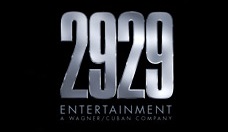
2929 Entertainment, LLC. is an American integrated media and entertainment company co-founded by billionaire entrepreneurs Todd Wagner and Mark Cuban. 2929 maintains companies and interests across several industries including entertainment development and packaging, film and television production and distribution, digital and broadcast syndication, theatrical exhibition, and home entertainment.

Embassy Pictures Corporation was an American independent film production and distribution studio, active from 1942 to 1986. Embassy was responsible for films such as The Graduate, The Producers, The Fog, The Howling, Escape from New York, and This Is Spinal Tap, and television series such as The Jeffersons, One Day at a Time and The Facts of Life.

A Band Apart Films was a production company founded by Quentin Tarantino, Michael Bodnarchek, and Lawrence Bender that was active from 1991 to 2006. Its name is a play on the French New Wave classic film, Bande à part by filmmaker Jean-Luc Godard, whose work was highly influential on the work of the company's members.
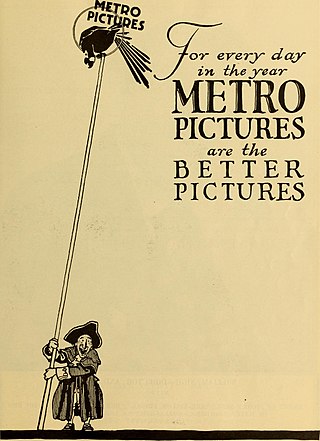
Metro Pictures Corporation was a motion picture production company founded in early 1915 in Jacksonville, Florida. It was a forerunner of Metro-Goldwyn-Mayer. The company produced its films in New York, Los Angeles, and sometimes at leased facilities in Fort Lee, New Jersey. It was purchased in 1919.
EMI Films was a British film studio and distributor. A subsidiary of the EMI conglomerate, the corporate name was not used throughout the entire period of EMI's involvement in the film industry, from 1969 to 1986, but the company's brief connection with Metro-Goldwyn-Mayer and Anglo-EMI, the division under Nat Cohen, and the later company as part of the Thorn EMI conglomerate are outlined here.
Producers Sales Organization was an independent motion picture production and sales company founded in 1977. Initiated by Mark Damon, an actor-turned-producer, PSO mostly handled foreign sales of independent films. It was initially a partnership between Damon, producer Sandy Howard, and Richard St. Johns, who worked for Arthur Guinness Son & Co. At one point, it was a subsidiary of Guinness.

Reb Brown is an American former football player and actor. Born in the Los Angeles area, Brown played football in high school and University. He first appeared on film and television in the early 1970s, playing minor or supporting roles up until 1979, where he played Captain America in two made-for-tv films.

Bryanston Distributing Company was an American film distribution company that was active during the 1970s. The company was founded by Louis Peraino and Philip Parisi in 1972. It went bankrupt in 1976, amid the company's numerous legal troubles.

Film Booking Offices of America (FBO), registered as FBO Pictures Corp., was an American film studio of the silent era, a midsize producer and distributor of mostly low-budget films. The business began in 1918 as Robertson-Cole, an Anglo-American import-export company. Robertson-Cole began distributing films in the United States that December and opened a Los Angeles production facility in 1920. Late that year, R-C entered into a working relationship with East Coast financier Joseph P. Kennedy. A business reorganization in 1922 led to its assumption of the FBO name, first for all its distribution operations and ultimately for its own productions as well. Through Kennedy, the studio contracted with Western leading man Fred Thomson, who grew by 1925 into one of Hollywood's most popular stars. Thomson was just one of several silent screen cowboys with whom FBO became identified.
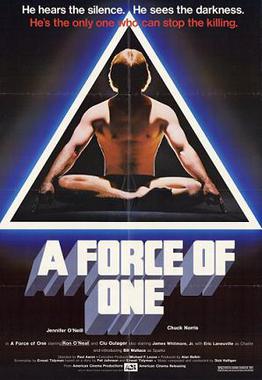
A Force of One is a 1979 American martial arts action-thriller film directed by Paul Aaron and starring Chuck Norris, with Jennifer O'Neill, Ron O'Neal, Clu Gulager, and martial artist Bill Wallace in his film debut. Norris plays karate champion Matt Logan, who is hired to assist an anti-narcotics police unit, who are being targeted by a killer. The screenplay by Ernest Tidyman was based on a story co-written by martial artist Pat E. Johnson.
Aaron Dee Norris is an American stunt performer, director, occasional actor, and film and television producer. He is the younger brother of action film star Chuck Norris.

Cinematic exhibition of the B movie, defined as a relatively low-cost genre film, has declined substantially from the early 1980s to the present. Spurred by the historic success of several big-budget movies with B-style themes beginning in the mid-1970s, the major Hollywood studios moved progressively into the production of A-grade films in genres that had long been low-budget territory. With the majors also adopting exploitation-derived methods of booking and marketing, B movies began to be squeezed out of the commercial arena. The advent of digital cinema in the new millennium appeared to open up new opportunities for the distribution of inexpensive genre movies.
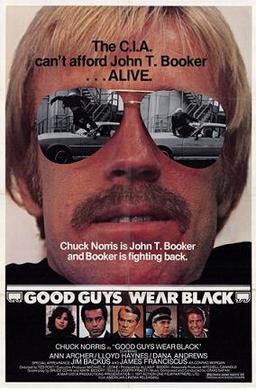
Good Guys Wear Black is a 1978 American martial arts action film starring Chuck Norris and directed by Ted Post. This was the second film to feature Norris as the star, following Breaker! Breaker! (1977). However, this is the one that Norris considers his "breakthrough".
The American Success Company is a 1980 American comedy-drama film directed by William Richert and starring Jeff Bridges. It was written by Larry Cohen. Re-edited versions of the film have appeared under the titles American Success, Success, The Ringer, and Good as Gold.
References
- ↑ "AFI|Catalog". catalog.afi.com. Retrieved 2021-06-15.
- 1 2 3 4 "AFI|Catalog". catalog.afi.com. Retrieved 2021-06-15.
- 1 2 3 4 5 6 7 | people = Eric Karson (Director) | title ="How American Cinema Changed Hollywood Forever" | medium = DVD production | publisher = American Cinema Group Inc. | date = 2003
- ↑ Dogs at the American Film Institute Catalog
- ↑ Drooz, A. (12 March 1981). "Chuck Norris aims for stardom". Los Angeles Times.
- ↑ Dirt at the American Film Institute Catalog
- ↑ "Fuel Cinema Sundays - DIRT 1979". Fuel Motorcycles. Retrieved 2021-06-15.
- ↑ "Closing the deadly gap". Screen International . August 4, 1979. p. 21.
- ↑ "American Cinema Productions". BFI. Archived from the original on June 15, 2021. Retrieved 2021-06-15.
- ↑ "Larry Cohen off 'I, the jury': Day, and 100G over budget". Variety. 6 May 1981. p. 29.
- 1 2 "AFI|Catalog". catalog.afi.com. Retrieved 2021-06-15.
- ↑ US Copyright Office Document No. V9978D886 / 2019-10-16